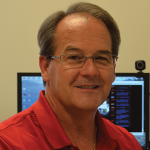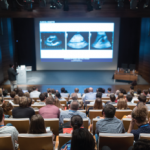Amy C. Cannella, MD, MS, associate professor, Division of Rheumatology, and director of the Rheumatology Fellowship Program, adds, “We have a strong community alliance for our patients and also the other physicians of Nebraska. They, in turn, have been wonderful in helping us accomplish our research mission.”
The Teaching Mission
Several of the faculty we interviewed professed a special passion for rheumatology, an enthusiasm initially sparked during their own training at UNMC. Dr. Cannella recalls that she was “hooked on my first day of my third year of medical school, and they reeled me in. They [the rheumatology faculty] were such great teachers, and I was amazed by their enthusiasm for their content, their patients and their commitment to me as a learner,” she says.
Before she signed on as a faculty member, Dr. Cannella worked in private practice and in two other academic settings. She is currently on the oversight committee to restructure the medical school curriculum and is responsible for the redesign of the five-week musculoskeletal and dermatology block.
Dr. Cannella is also committed to the use of musculoskeletal ultrasound (MSUS) as a teaching tool for medical students and for the delivery of clinical care for rheumatology patients. She is an advocate for MSUS in fellow education, is a member and instructor for the Ultrasound School of North American Rheumatologists (USSONAR) and is chairing the ACR MSUS fellow curriculum development. The culture of the division, she says, “fosters support for faculty education initiatives across the board, and little has changed in the commitment to education since I was a student.”

Dr. Geoffrey M. Thiele
Geoffrey M.Thiele, PhD, wears many hats in the division, and his career is emblematic of its dedication to excellence in teaching. Originally hired in 1985 by Dr. Klassen after attaining his doctorate in microbiology/immunology, Dr. Thiele began what has now grown to a 30-year collaboration with the division founder. Dr. Klassen started the bone marrow transplant center and initiated the Experimental Immunology Laboratory, which Dr. Thiele now directs. He saw the opportunity to work with Dr. Klassen and the burgeoning division as an “incredible opportunity.”
Working with the large VA population in Omaha, their original collaborations focused on the autoimmune components of alcoholic liver disease. In addition to continuing work on the effects of altered self-proteins on the immune response, Dr. Thiele is currently a professor in internal medicine and co-director with Dr. Mikuls of the VARA biobank.4 He is also in charge of revisions to the immunology aspects of the new curriculum, working with Dr. Cannella and others on the committee to restructure the UNMC medical school curriculum.



